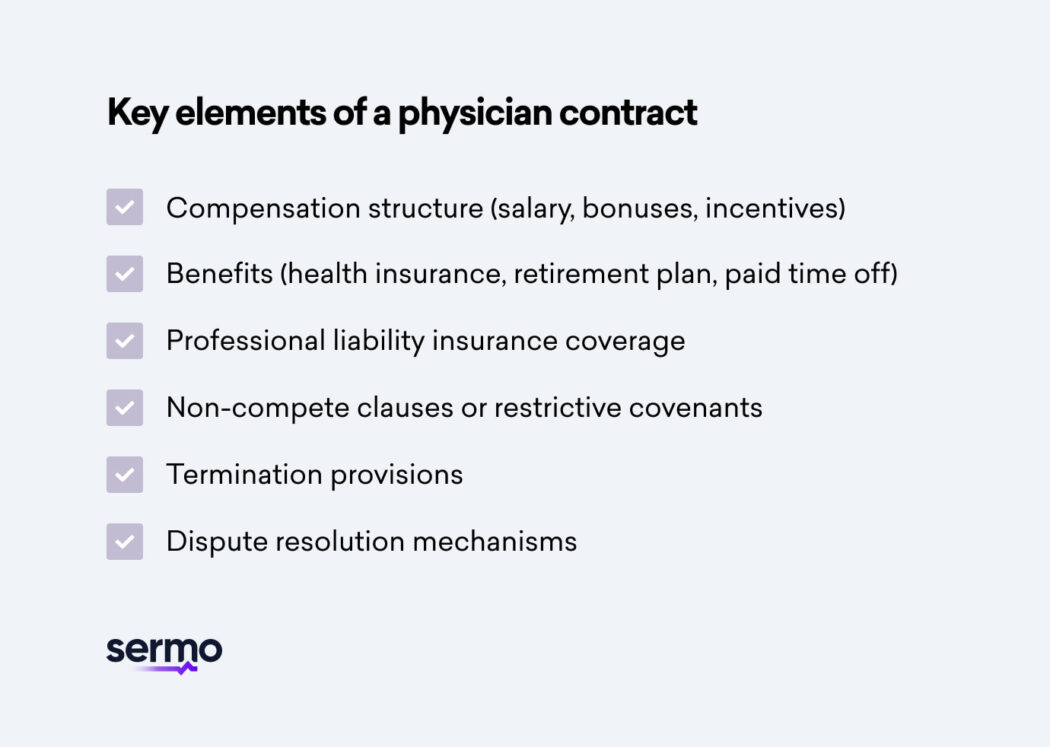
Negotiating a physician contract is an essential aspect of a medical professional’s career. This process not only impacts their compensation, but also the terms and conditions under which they practice medicine. Navigating the complexities of physician contracts, including the various components and legalities, can be challenging.
By understanding the importance of negotiating physician contracts and implementing effective strategies, medical professionals can ensure that they secure the best possible terms for their employment. A well-negotiated contract can significantly impact a physician’s career, financial stability, and professional satisfaction. By understanding the essential elements of physician employment agreements and leveraging effective negotiation strategies, you can secure a contract that meets your professional needs and aligns with your long-term career goals.
In this article we will provide an overview of doctor employment contracts, discuss the importance of negotiating them, and offer practical tips for successful negotiation.

What is a physician employment contract?
A physician employment contract is a legally binding agreement between a medical professional and their employer, which outlines the terms and conditions of their employment. These contracts are common for physicians working in hospitals, clinics, and private practices. Physician contracts with hospitals, for example, may detail the doctor’s clinical responsibilities, compensation, benefits, work schedule, call coverage, and other pertinent information.
Not all physician jobs will have an employment contract. In a recent Sermo survey, 69% of participants said they had signed an employment agreement, with 31% stating they had not. For those that do, it is important to carefully review the contract and understand its contents. Some key elements to look for in a contract include:

The importance of negotiating physician contracts
When we asked physicians about their thoughts on negotiating contracts:
“I get a lot of questions on contract issues in my Medicolegal columns (every Wednesday on Sermo!) and the most important advice that I can give is that you must never sign on a term thinking that you can change it later. As an educated person who can understand complex terms and who also had the option to have a lawyer review the contract, you will be held to what you agreed to.”
Radiology, US
“I think physician should carefully look into their employment contract and this forms the key of their working condition and compensation, at the start it may sound not important but this can significantly alter our life and exit strategy at later stage. Therefore, as physician we need to be extremely careful in blindly signing such contracts”
Cardiothoracic Surgery, Great Britain
Negotiating physician contracts is crucial for several reasons. First, these contracts can be quite lengthy, sometimes lasting for several years. Given the long-term nature of these agreements, it is important to ensure that the terms are favorable and meet the physician’s professional and personal needs.
Second, physician contracts are legally binding, meaning that the physician is obligated to fulfill the terms of the agreement. A well-negotiated contract can provide the physician with security, stability, and a clear understanding of their responsibilities and expectations.

Physician contract negotiation tips
1. Know your priorities before you negotiate
Before entering into negotiations, it is important for doctors to have a clear understanding of their priorities. Consider factors such as location, work-life balance, professional growth opportunities, and compensation when determining what is most important. Determine which aspects of the contract are most important to you, such as compensation, work schedule, professional development opportunities, or support for research and teaching.
Rank these factors in order of importance and use this list to guide your negotiations. Knowing your priorities will help you stay focused on the terms that matter most to you and prevent you from getting sidetracked by less important issues.
2. Research the offer
Before contracting, doctors should research the organization, its financial stability, and the market value for your specialty. Gather information about the organization, its culture, and the local market before negotiating your physician employment agreement. This information will help you gauge the competitiveness of the offer and determine what aspects of the contract might be negotiable.
Research the average compensation and benefits packages for similar positions in the area to determine if the offer is competitive. Understanding the market standards will help you negotiate a fair and reasonable contract.
Use resources such as salary surveys, industry reports, and professional associations to gather information on market trends and compensation benchmarks.
Additionally, research the organization’s reputation, financial stability, and work environment. Reach out to current or former employees to gain insights into the organization’s culture and operations. This information will help you evaluate whether the organization aligns with your professional goals and values.
3. Review the contract details with a professional
Physician employment agreements can be complex and may contain legal jargon that is difficult to understand.
Consulting with an experienced attorney or professional familiar with medical contracts is highly recommended. They can review the contract, identify potential pitfalls, and offer guidance on areas that may require negotiation. Additionally, a professional can help ensure that the contract complies with applicable laws and regulations.
4. Determine what to negotiate
Identify the aspects of the contract that are most important to you and prioritize them for negotiation. Common areas of negotiation include compensation, work schedule, call coverage, and restrictive covenants.
After reviewing the contract and identifying your priorities, determine the specific terms that you want to negotiate. Keep in mind that negotiations may involve compromises, so be prepared to prioritize the most critical aspects of the contract. Consider factors such as:
- Compensation and bonuses: Ensure that your base salary, incentive compensation, and bonus structure are competitive and aligned with your experience and qualifications.
- Work schedule and call responsibilities: Negotiate a schedule that allows for work-life balance and clearly outlines call responsibilities and compensation for call coverage.
- Professional development opportunities: Advocate for adequate support for continuing medical education, membership in professional associations, and participation in conferences.
- Research and teaching opportunities: If research and teaching are essential to your career, negotiate for protected time and financial support for these activities.
5. Come prepared
When entering negotiations, be prepared with supporting documentation, such as market data on compensation, and be ready to articulate your value to the organization. Demonstrating your worth and backing it up with evidence can strengthen your negotiating position. Being well-prepared demonstrates your commitment to reaching a fair agreement and can help facilitate productive discussions.

6. Understand termination provisions
Review the termination provisions in the contract, including the grounds for termination, notice requirements, and any potential severance payments. Understanding these provisions can help protect your interests in the event of contract termination.
7. Assess non-compete clauses
Non-compete clauses, also known as restrictive covenants, limit a physician’s ability to practice medicine within a specific geographic area and for a certain period after leaving the employer. These clauses can significantly impact your professional freedom and future career opportunities. When reviewing non-compete clauses, consider the following:
- Evaluate the reasonableness of the geographic scope and duration of the non-compete clause.
- Ensure that the clause does not unduly restrict your ability to practice medicine in your chosen field or location.
- Negotiate modifications to the non-compete clause, such as reducing the geographic scope or duration, if necessary.
8. Evaluate intellectual property provisions
Some physician contracts may include provisions related to intellectual property rights, particularly if your work involves research, innovation, or the development of new medical techniques. Review these provisions carefully and consider the following:
- Ensure that the contract clearly defines the ownership of intellectual property rights, including patents, copyrights, and trademarks.
- Negotiate terms that protect your rights to any intellectual property you develop during your employment.
- Clarify the process for disclosing and commercializing new inventions or innovations, including revenue sharing and royalties.
9. Examine malpractice insurance coverage
Malpractice insurance coverage is a critical aspect of physician contracts, as it protects you from financial liability in the event of a lawsuit. When reviewing malpractice insurance provisions, consider the following:
- Ensure that the contract specifies the type of coverage provided, such as occurrence-based or claims-made coverage.
- Confirm that the coverage limits are adequate and consistent with industry standards.
- Negotiate for tail coverage, which extends your malpractice insurance coverage beyond the termination of your employment, if necessary.
10. Understand partnership opportunities
If your contract involves the potential for partnership or ownership in a private practice or healthcare organization, carefully examine the terms related to these opportunities. Consider the following:
- Evaluate the partnership track, including the timeline, criteria for evaluation, and any financial obligations associated with partnership.
- Assess the potential benefits of partnership, such as increased compensation, decision-making authority, and equity in the organization.
- Clarify the process for exiting the partnership, including buyout provisions and the valuation of your ownership interest.
11. Prepare for counteroffers and concessions
During the negotiation process, be prepared to receive counteroffers and make concessions on certain contract terms. To navigate this stage effectively:
- Prioritize your negotiation points, focusing on the most critical aspects of the contract.
- Be open to compromise and consider alternative solutions that can meet both your needs and those of your employer.
- Maintain a professional and respectful demeanor throughout the negotiation process, even when faced with challenging discussions or disagreements.
12. Leverage multiple job offers
If you have multiple job offers, you may be able to leverage this situation to negotiate better terms with each potential employer. Consider the following strategies:
- Share information about competing offers with each employer, emphasizing the aspects of each offer that are most appealing to you.
- Use the competition to your advantage by expressing your interest in each opportunity and indicating your willingness to consider the most competitive offer.
- Be transparent and professional in your communications, avoiding any attempts to pit employers against each other or create animosity.
13. Familiarize yourself with industry standards and regulatory requirements
Before entering contract negotiations, take the time to familiarize yourself with
industry standards and any regulatory requirements that may apply to your contract. This includes:
- Reimbursement models and payment structures commonly used in your specialty
- State and federal regulations governing physician employment, such as Stark Law and the Anti-Kickback Statute
- Guidelines from professional organizations and accrediting bodies relevant to your field
Having a solid understanding of these standards and requirements will help you identify potential compliance issues in the contract and advocate for terms that are consistent with industry norms.

14. Develop your negotiation skills
Effective negotiation involves a combination of communication skills, strategic thinking, and emotional intelligence. To improve your negotiation skills:
- Practice active listening and empathy, striving to understand the other party’s perspective and needs.
- Develop clear and concise communication skills, focusing on expressing your needs and concerns in a manner that is easy to understand and persuasive.
- Cultivate a collaborative mindset, emphasizing the importance of finding mutually beneficial solutions rather than engaging in adversarial tactics.
- Manage your emotions during negotiations, remaining calm and professional even in the face of disagreement or frustration.
15. Anticipate potential obstacles and challenges
In any negotiation, it is essential to anticipate potential obstacles and challenges and develop strategies to address them. This may include:
- Identifying areas of the contract that are likely to be contentious or subject to negotiation
- Developing alternative proposals or solutions for challenging contract terms
- Preparing counterarguments and supporting evidence to address potential objections or concerns
By anticipating potential challenges and planning for them in advance, you can approach negotiations with greater confidence and resilience.
16. Seek feedback and mentorship
If you are new to contract negotiations or looking to improve your skills, seek feedback and mentorship from experienced colleagues, mentors, or professional associations. These individuals can provide valuable insights and advice on successful negotiation strategies and help you identify areas for improvement. Additionally, participating in workshops or courses focused on negotiation skills can also enhance your abilities and confidence in this area.
17. Maintain flexibility and adaptability
During the negotiation process, it is essential to maintain a degree of flexibility and adaptability. Recognize that you may not achieve all of your goals in the negotiation, and be prepared to prioritize the most critical aspects of the contract. Also, be open to exploring creative solutions and compromises that can address both your needs and those of your employer.
18. Establish a positive working relationship
Finally, remember that the negotiation process is not only about securing favorable contract terms but also about establishing a positive working relationship with your employer. Throughout the negotiations, maintain a professional and respectful demeanor, focusing on open communication, collaboration, and mutual understanding. By building a strong foundation of trust and goodwill during the negotiation process, you can set the stage for a successful and satisfying professional partnership.
Conclusion
Negotiating physician contracts is a critical aspect of a medical professional’s career. By understanding the importance of this process and implementing effective negotiation strategies, physicians can secure favorable terms that meet their professional and personal needs. Engaging with physicians within a community like Sermo can provide invaluable assistance in navigating the complexities of physician contracts.














